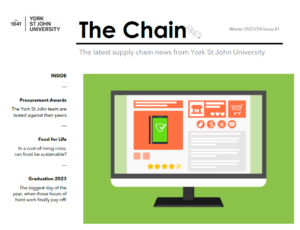The first issue of The Chain (Winter 2023/24 Issue #1) the quarterly YSJ supply chain and procurement newsletter is now available to download, via the link below.

The Chain magazine cover #1

The first issue of The Chain (Winter 2023/24 Issue #1) the quarterly YSJ supply chain and procurement newsletter is now available to download, via the link below.

The Chain magazine cover #1

Small steps leave greener footprints.
There is a drive in procurement circles to be able to demonstrate that the work we do is sustainable. This can sometimes be a blunt tool used to deliver a precise job, but it does raise the question – why isn’t all procurement sustainable anyway? The opposite would be unsustainable procurement and surely nobody sets out at the start of a project or a contract with the intention that it will run out of steam part way through. If a contract cannot be sustained over its lifetime, or it needs other activity to artificially prop it up, then it isn’t sustainable, it will incur undue additional costs and likely collapse before its intended completion.
McKinsey and EuroCommerce recently looked at the potential to limit carbon emissions in the retail sector (https://www.eurocommerce.eu/transforming-retail-wholesale) and felt that a 90% reduction was possible. However, it required something in the region of €300 of investment to get there. Higher Education providers in the UK probably have similar sized challenge, especially as they oversee much older estates than the retail sector and are also heavily exposed to energy price fluctuation. All those big lecture halls and libraries need heating now we’re out of the pandemic and students are back on campus. Chasing consensus on clever contract clauses that will hold suppliers accountable for their social and environmental responsibilities will help, but only for those accounts that procurement teams are involved in negotiating.
Procurement teams may not be responsible for every purchase made in their institutions, loath as they may be to admit it. Matters of non-compliance and rogue spending aside, not every contract will fall under their scope for influenceable spend. It is uncommon for procurement procedures to be mandated, even where they are strongly recommended. Having a semi-centralised hybrid model with elements of devolved authority is more typical. This makes it all the more vital for procurement professionals to have excellent soft skills – the abilities to persuade, win buy-in, to encourage and to empathise with the needs of stakeholders. Where they can’t change behaviours with edicts from up on high, they will be called upon to engage with their colleagues and help them to see the world through their eyes.
It’s not unheard of for a cost centre manager or a budget holder to be laser focused on their in-year savings, as their personal objectives will be probably based on achieving those. Indeed, procurement can be encouraged to chase those ‘smash and grab’ style deals, with unachievable targets and little thought given to how a contract can be sustained for its duration. With the current economy being in a downturn, this sort of scenario is likely to become more commonplace as procurement is called up to the plate to lower costs and reduce the overall exposure to future costs.
If procurement teams are pressured to pursue in-year or short-term savings, it could risk the longer term commercial sustainability of contracts if suppliers are unduly pressured to cut costs and trim corners. In addition, as part of this general belt-tightening, the wider environmental and social sustainability of contracts ends up being reclassified as ‘nice to haves’ or value-add features. If they are not seen as fundamental elements of core delivery, then these might well end up being the first casualties. If the economy slows down further, then procurement teams may be the people being asked to use their soft skills again to encourage their organisations to see the long term value of non-cost benefits that contribute to the wider social and environmental impact of their supplier contracts.

I feel the need… the need for procurement compliance!
The primary focus of any procurement team will be to obtain goods and services in a cost effective and timely manner. However, in any complex organisation there will likely be a whole range of policies and procedures that define the particular way that activity needs to be carried out. Managing compliance may not always be a glamorous part of the job and indeed it can give procurement people a reputation as being something like traffic wardens – people accept that they have a legitimate role to play, but they don’t always appreciate it when it comes to enforcing the rules.
Having worked in a number procurement teams across very different organisations, I have seen non-compliance and maverick spending in many forms. Whilst all of these companies had very clear procurement policies that specified how money should be spent, who can spend it, and who needs to be told when it is being spent – there are still instances where individuals step beyond those guidelines and go rogue. It is very rare that anyone does this with the intention of causing harm to their organisation, or for reasons of personal gain – though there is always a risk that someone is avoiding the rule because they’re getting up to something nefarious e.g. fraud.
It may be that a perfectly sensible policy has been badly communicated and they’re simply not aware of their obligations and the consequences of not following the prescribed course of action. It might be that the policy itself is too generic and causes operational challenges for a particular team and it’s impairing their ability to carry out their day to day work. Most people just want the things they need to do their jobs and it can be these good intentions that drive them to take perceived short cuts, that end up generating administrative headaches to put right later. This could involve setting up new suppliers for payment, contractual disputes or even the receipt of goods and services that are unsuitable for use. Duplication and unnecessary work all round, that doesn’t solve the issue that started this chain of events – people wanting to get their jobs done and needing things to achieve that. Of course, there is always a hard line that can’t be crossed – overspend, or unethical spend can occur by accident more often than by design. These are usually disciplinary matters and whilst procurement may be responsible for enforcing rules, the consequences that follow from a health and safety breach (bought poorly) or committing to spend money you don’t actually have (bought too much) are likely to fall to Human Resources or Finance teams.
However, there are things that procurement people can do to get on the front foot, and having good relationships with our internal teams will always go half of the way towards limiting these instances of maverick spending. Being proactive and asking them what is in their future plans that will need additional procurement, or finding out what is not working right at this moment. If you can have those conversations earlier, rather than later, you might save yourself a lot of unwanted surprises further down the line.